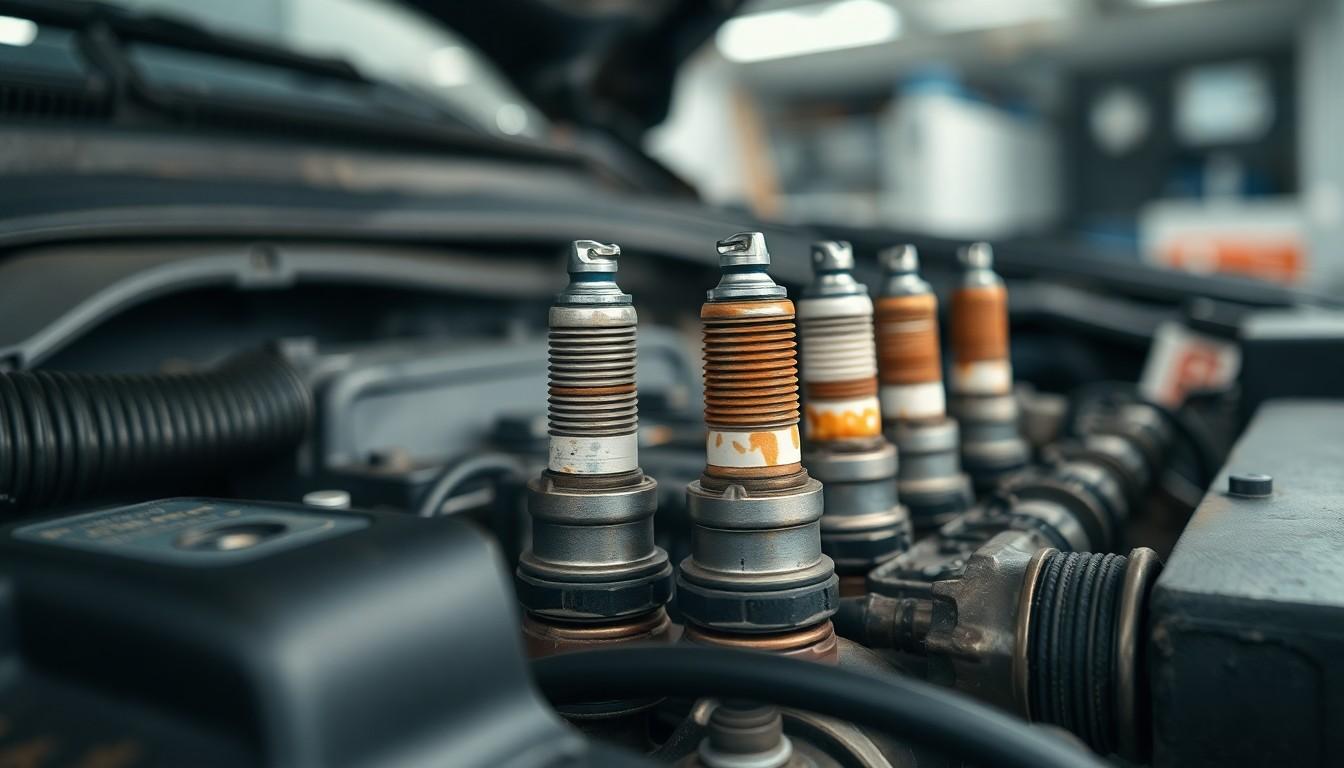Replacing spark plugs is one of those maintenance tasks that can save you money and extend your engine’s life – yet many drivers are shocked by the wide range of prices they encounter. We’ve noticed countless customers wondering if they’re being overcharged or if they should attempt this repair themselves.
At its core, spark plug replacement should be reasonably affordable, but several factors influence the final cost. The type of vehicle you drive, the quality of replacement plugs, and whether you choose DIY or professional service all play important roles in determining what you’ll pay. With prices typically ranging from $16-$100 for DIY projects and $40-$450 for professional service, knowing what’s fair can prevent you from overpaying.
Understanding Spark Plug Replacement Costs
Spark plug replacement costs vary widely based on several key factors that every vehicle owner should consider. Labor charges typically range from $40-$150 depending on your location and the shop’s hourly rates. The accessibility of spark plugs in your engine significantly impacts labor costs—engines with easily accessible plugs require only 30 minutes of work, while complex V-shaped or boxer engines might need 2-3 hours for complete replacement.
Parts pricing differs dramatically based on quality and material. Standard copper spark plugs cost $2-$5 per plug, while premium iridium or platinum options range from $8-$25 each. Most passenger vehicles need 4-6 spark plugs, though high-performance V8 engines require 8 plugs, and some luxury vehicles might need up to 16 plugs for their dual-ignition systems.
Dealerships often charge 20-40% more than independent mechanics for the same spark plug replacement service. Luxury and high-performance vehicles generally incur higher costs due to specialized parts and more complex engine designs that require additional labor time. European models like BMW and Mercedes-Benz typically cost $250-$450 for spark plug replacement compared to $120-$250 for most Japanese and American vehicles.
The plug replacement interval also affects lifetime costs. Traditional copper plugs need replacement every 30,000-40,000 miles, while premium iridium plugs can last 100,000+ miles even though their higher initial cost. Many repair shops offer package deals that include spark plug replacement alongside other maintenance services, potentially reducing the overall cost by 10-15% compared to scheduling separate appointments.
Average Cost of Spark Plug Replacement

Spark plug replacement costs typically range between $270 and $381 for a complete service. The final price varies considerably based on your vehicle’s engine configuration, the type of spark plugs selected, and whether you choose a dealership or independent shop for the service.
Parts Cost Breakdown
Spark plug prices differ dramatically depending on their material composition and longevity:
- Copper Spark Plugs: $2-$10 each (most affordable but shortest lifespan)
- Silver Spark Plugs: Approximately $5 each
- Platinum/Double Platinum: $10-$20 each (longer lifespan than copper)
- Iridium Spark Plugs: $20-$100 each (premium option with longest durability)
A complete set of spark plugs ranges from $16 to $100, with the total cost dependent on your engine’s cylinder count. For example, a 4-cylinder engine using platinum spark plugs at $20 each totals $80 just for parts. Vehicles with 8-cylinder engines requiring two plugs per cylinder could see parts costs climbing to $320.
Labor Cost Factors
Labor charges for spark plug replacement generally fall between $181 and $265, though they can range from $40 to $350 based on several factors:
- Engine Configuration: V6 and V8 engines typically incur higher labor costs than inline 4-cylinder engines due to increased complexity and access challenges
- Vehicle Design: Some vehicles require partial disassembly of components to access the spark plugs, significantly increasing labor time
- Service Provider: Independent shops often charge substantially less than dealerships for identical services
- Geographic Location: Labor rates vary considerably by region, with urban areas generally commanding higher prices
The accessibility of spark plugs represents the most important labor cost factor, as difficult-to-reach plugs can transform a simple job into a complex, time-consuming procedure requiring specialized tools and expertise.
DIY vs. Professional Replacement

Replacing spark plugs offers car owners a choice between doing it themselves or hiring a professional. This decision impacts both cost and quality of the service, with each option having distinct advantages depending on your situation and skill level.
DIY Replacement
DIY spark plug replacement can be a straightforward and economical option for many vehicle owners. The process typically takes about an hour for a 4-cylinder engine when the plugs are easily accessible. Your only expense will be the spark plugs themselves, which range from $10 to over $25 each depending on the type. Copper plugs cost less while platinum plugs run around $20 each, so a 4-cylinder engine would require about $80 in parts. Taking the DIY route eliminates labor costs entirely, which typically range between $181 and $265.
Professional Replacement
Professional spark plug replacement averages between $270 and $381 total, including both parts and labor. Mechanics have specialized tools and experience to handle complicated engine configurations. Technicians can quickly identify potential issues during the replacement process, preventing future problems. Service centers often provide warranties on their work, giving you peace of mind about the quality of installation. Professional service becomes particularly valuable for luxury or high-performance vehicles where precise installation is critical.
Cost Savings of DIY Installation
DIY installation offers substantial savings on labor costs that range from $181 to $265. A typical spark plug replacement costing $300 professionally could save you approximately $200 when done yourself. These savings multiply with vehicles that have more cylinders or require two spark plugs per cylinder. Performing the job yourself also eliminates shop fees and markups on parts. Regular DIY maintenance builds your knowledge of your vehicle’s systems and helps you spot other potential issues.
When to Choose Professional Service
Professional service becomes necessary when spark plugs are difficult to access and require important disassembly. Engines with complex configurations often need specialized tools that most home mechanics don’t possess. Your lack of experience with spark plug replacement increases the risk of cross-threading or over-tightening, potentially causing expensive damage. Time constraints and convenience factors might justify the additional cost of professional service. Certain warranty considerations may require documented professional maintenance to remain valid. Professional mechanics can also perform additional diagnostics to ensure your ignition system is functioning optimally beyond just replacing the spark plugs.
Cost Variations by Vehicle Type

Spark plug replacement costs vary significantly depending on your vehicle type, with differences in engine design and complexity being the primary factors. Let’s examine how costs differ across various vehicle categories and what to expect when it’s time for replacement.
Economy Cars vs. Luxury Vehicles
Economy cars typically feature simpler engine designs with more accessible spark plugs, resulting in lower replacement costs. Total costs for economy vehicles like the Toyota Camry range from $151 to $215, making spark plug replacement a relatively affordable maintenance task. These vehicles often have straightforward four-cylinder engines where technicians can access plugs without extensive disassembly.
Luxury vehicles, in contrast, come with more complex engine configurations and sophisticated components that increase both parts and labor expenses. Replacement costs for luxury models start around $250 and frequently exceed $500. These premium vehicles often require specialized tools and technical expertise to access deeply embedded spark plugs. Labor costs rise substantially due to the additional time needed to navigate intricate engine bays and carefully remove surrounding components before reaching the plugs.
Special Considerations for High-Performance Engines
High-performance engines, particularly V6 and V8 configurations found in sports cars and larger trucks, present unique challenges for spark plug replacement. Ford F-150 owners, for example, face total replacement costs between $330 and $437 due to their more complex engine layouts. These engines feature spark plugs that are deliberately positioned for optimal performance rather than ease of maintenance.
Accessibility issues significantly impact labor costs for high-performance vehicles, as technicians must often remove multiple components to reach the plugs. Many performance engines require premium spark plugs such as platinum or iridium variants, which cost $20 to $100 each compared to standard copper plugs. Performance vehicles also frequently need related component replacements during spark plug service, including coil packs, oxygen sensors, and specialized spark plug wires that contribute to the overall expense.
Factors That Influence Spark Plug Replacement Pricing

Spark plug replacement costs vary significantly based on several key factors that affect both parts and labor expenses. Understanding these variables helps vehicle owners budget appropriately and make informed decisions about this essential maintenance service.
Location and Shop Rates
Labor costs represent a substantial portion of spark plug replacement expenses, ranging from $40 to $350 depending on your location and the type of service provider you choose. Average labor charges fall between $129 and $163 for standard vehicles, but can reach up to $265 for more complex engines. Geographic location plays a crucial role in determining hourly rates, with urban areas typically charging more than rural locations. Independent mechanics generally offer more competitive rates compared to dealerships, which often charge premium prices. The complexity of your engine configuration directly impacts labor time, with V6 and V8 engines requiring more work and so higher costs than four-cylinder engines.
Spark Plug Types and Quality Differences
Spark plug materials significantly impact both price and longevity, creating an important cost-benefit consideration for vehicle owners. Copper plugs cost less than $5 each but wear out fastest, making them economical for short-term use. Platinum plugs start around $6 and offer extended lifespan compared to copper varieties, providing better value for many standard vehicles. Iridium plugs begin at $8 and last considerably longer than both copper and platinum options, reducing the frequency of replacements. Premium options like double platinum and high-grade iridium plugs range from $10 to $30 each but last nearly twice as long as standard versions, potentially offering better long-term value even though higher initial costs. Engine size directly affects total replacement expense since vehicles with more cylinders require additional spark plugs, increasing both parts and labor expenses proportionally.
Warning Signs You Need New Spark Plugs

Engine Misfires
Engine misfires occur when spark plugs fail to properly ignite the air and fuel mixture in the combustion chamber. You’ll notice your engine sputtering, hesitating, or jerking during acceleration. These misfires not only affect performance but can lead to damage in other engine components if left unaddressed. Many drivers describe this sensation as the car “hiccupping” during operation.
Rough Idling
Malfunctioning spark plugs cause your engine to vibrate or run roughly while idling. This uneven performance manifests as unusual sounds or vibrations when your vehicle is stationary with the engine running. The tachometer might fluctuate instead of maintaining a steady RPM level. Your steering wheel, seats, or entire vehicle might shake noticeably at stop lights or in park.
Decreased Fuel Efficiency
Spark plugs directly impact your vehicle’s fuel economy when they’re not functioning correctly. Your engine cannot perform optimally with failing spark plugs, resulting in increased fuel consumption. Many drivers notice they’re suddenly filling up their gas tank more frequently without changes in their driving habits. Tracking your miles per gallon can help identify this warning sign early, potentially saving hundreds of dollars in unnecessary fuel costs.
Other Signs
Modern vehicles display exact OBD (On-Board Diagnostic) codes that indicate spark plug issues. Codes such as P0171 (System Too Lean), P0174 (System Too Lean), and P0263 (Cylinder 1 Contribution/Balance) often relate to spark plug performance problems. Your check engine light illuminating on the dashboard serves as an early warning system for potential spark plug issues. Hard starting, especially in cold weather, frequently indicates degraded spark plugs that struggle to create sufficient spark. Engine surging, where your car unexpectedly accelerates slightly without pressing the gas pedal, can also signal spark plug problems.
How to Save Money on Spark Plug Replacement

DIY Replacement
DIY spark plug replacement presents a important opportunity to save on labor costs, which average between $181 and $265. Accessing and replacing spark plugs yourself eliminates these expenses completely when the plugs are easily reachable in your engine bay. Following proper procedures ensures a successful replacement, including using the correct spark plug gap, applying anti-seize compound on the threads, and coating the spark plug terminal with dielectric grease for optimal electrical connection.
Choose the Right Spark Plugs
Selecting appropriate spark plugs for your vehicle creates long-term savings even though potential higher upfront costs. Iridium spark plugs, while priced between $20 and $100 each, offer exceptional longevity with replacement intervals of 100,000 to 120,000 miles. Standard copper plugs cost only $2 to $10 each but require replacement much sooner at 30,000 to 40,000 miles. Platinum and double platinum options fall in the middle range at $10 and $20 respectively, offering a balance between cost and durability.
Replace All Spark Plugs at Once
Replacing the complete set of spark plugs simultaneously prevents multiple service visits and ensures consistent engine performance across all cylinders. This comprehensive approach also provides an opportunity to inspect and replace related components affecting spark plug performance, such as spark plug wires and fuel filters. Complete replacements typically cost between $16 and $100 for parts depending on plug type and cylinder count, representing better value than individual replacements over time.
Regular Maintenance
Regular vehicle maintenance extends spark plug life and maximizes your investment in replacement parts. Oil changes and filter replacements prevent buildup around spark plugs that can reduce their effectiveness. An old fuel filter, for example, often causes oil and carbon accumulation on plugs, diminishing performance and potentially shortening their useful lifespan. Maintenance routines that keep the entire fuel and ignition systems clean contribute to optimal spark plug function and fewer replacements over your vehicle’s lifetime.
Conclusion
When it comes to spark plug replacement costs we’ve seen they typically range from $270-$381 for professional service while DIY projects can cost as little as $16-$100. The right choice depends on your vehicle type engine configuration and comfort level with car maintenance.
Investing in higher-quality spark plugs might cost more upfront but can save money long-term through extended replacement intervals. Remember that recognizing warning signs early and maintaining your vehicle properly will help you avoid unnecessary expenses.
By understanding the factors that influence pricing you’ll be better equipped to make informed decisions about your vehicle’s maintenance needs and ensure you’re getting fair value for this essential service.
Frequently Asked Questions
How much does spark plug replacement cost?
The average cost ranges from $270 to $381 for a complete service. DIY replacement costs between $16-$100 for parts only, while professional services range from $40-$450 depending on vehicle type, spark plug quality, and labor rates. Economy cars typically cost $151-$215, while luxury vehicles can exceed $500.
How often should spark plugs be replaced?
Replacement intervals vary by spark plug type. Copper plugs need replacement every 30,000-40,000 miles. Premium platinum plugs last 60,000-80,000 miles, while iridium plugs can last over 100,000 miles. Check your vehicle’s owner manual for manufacturer-specific recommendations.
What are signs that spark plugs need replacement?
Watch for engine misfires, rough idling with unusual vibrations, decreased fuel efficiency, hard starting in cold weather, engine surging, and an illuminated check engine light. If you notice these symptoms, have your spark plugs inspected promptly to prevent more expensive repairs.
Can I replace spark plugs myself?
Yes, DIY spark plug replacement is possible for many vehicles and can save $181-$265 in labor costs. The job typically takes about an hour for a 4-cylinder engine. However, vehicles with complex engine designs or difficult-to-access spark plugs may require professional service for proper installation.
What types of spark plugs are available?
There are three main types: copper (most affordable at $2-$10 each but shortest lifespan), platinum (moderate cost with better longevity), and iridium (premium at $20-$100 each with the longest lifespan over 100,000 miles). Your vehicle’s requirements and your budget will determine the best choice.
Why do spark plug replacement costs vary so much?
Costs vary due to vehicle type, engine complexity, spark plug accessibility, plug quality, and service provider. V6 and V8 engines cost more than 4-cylinder engines. Luxury vehicles require more expensive parts and specialized service. Geographic location also affects labor rates, with urban areas typically charging more.
Is it worth paying extra for premium spark plugs?
Yes, premium iridium or platinum spark plugs often provide better value despite higher upfront costs ($8-$25 each). They last 2-3 times longer than standard copper plugs ($2-$5 each), require less frequent replacement, and can deliver improved performance and fuel efficiency over their extended lifespan.
Should I replace all spark plugs at once?
Yes, replacing all spark plugs simultaneously ensures consistent engine performance. Even if only one plug is failing, the others are likely at a similar age and condition. This approach prevents multiple service visits and provides an opportunity to inspect related components for potential issues.
















